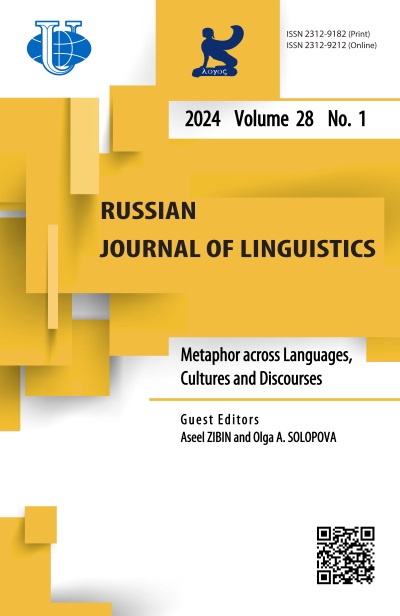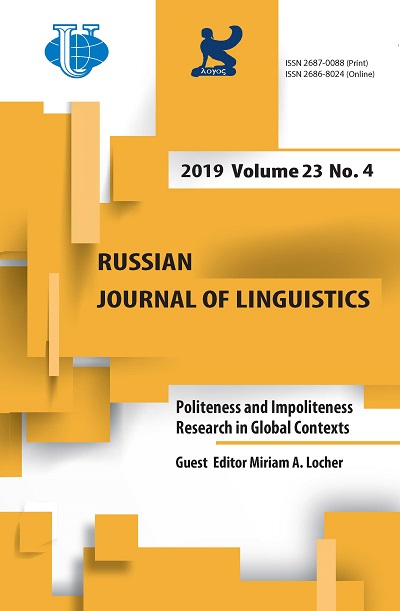Indirectness in the Age of Globalization: A Social Network Analysis
- Authors: Terkourafi M.1
-
Affiliations:
- Leiden University Centre for Linguistics
- Issue: Vol 23, No 4 (2019): Politeness and Impoliteness Research in Global Contexts
- Pages: 930-949
- Section: Articles
- URL: https://journals.rudn.ru/linguistics/article/view/22525
- DOI: https://doi.org/10.22363/2687-0088-2019-23-4-930-949
Cite item
Full Text
Abstract
Indirectness has traditionally been viewed as commensurate with politeness and attributed to the speaker’s wish to avoid imposition and/or otherwise strategically manipulate the addressee. Despite these theoretical predictions, a number of studies have documented the solidarity-building and identity-constituting functions of indirectness. Bringing these studies together, Terkourafi 2014 proposed an expanded view of the functions of indirect speech, which crucially emphasizes the role of the addressee and the importance of network ties. This article focuses on what happens when such network ties become loosened, as a result of processes of urbanization and globalization. Drawing on examples from African American English and Chinese, it is argued that these processes produce a need for increased explicitness, which drives speakers (and listeners) away from indirectness. This claim is further supported diachronically, by changes in British English politeness that coincide with the rise of the individual Self. These empirical findings have implications for im/politeness theorizing and theory-building more generally, calling attention to how the socio-historical context of our research necessarily influences the theories we end up building.
About the authors
Marina Terkourafi
Leiden University Centre for Linguistics
Email: m.terkourafi@hum.leidenuniv.nl
professor and chair of sociolinguistics at Leiden University Van Wijkplaats 4, 2311 BX Leiden, The Netherlands
References
- Barker, Chris (2012). Cultural Studies: Theory and Practice. London: Sage.
- Bourdieu, Pierre (1990). The Logic of Practice. Transl. by R. Nice. Cambridge: Polity Press.
- Brown, Penelope & Stephen C. Levinson (1987). Politeness: Some Universals in Language Usage. Cambridge: Cambridge University Press.
- Dunbar, Robin (1992). Neocortex size as a constraint on group size in primates. Journal of Human Evolution, 22: 6, 469-493.
- Chen, Rong (1993). Responding to compliments: A contrastive study of politeness strategies between American English and Chinese. Journal of Pragmatics, 20: 49-75.
- Chen, Rong & Dafu Yang (2010) Responding to compliments in Chinese: Has it changed? Journal of Pragmatics, 42: 7, 1951-1963.
- Clark, Herbert H. (1986). Using Language. Cambridge: Cambridge University Press.
- Culpeper, Jonathan & Dawn Archer (2008). Requests and directness in Early Modern English trial proceedings and play-texts, 1640-1760. In A.H. Jucker, & I. Taavitsainen (eds.). Speech Acts in the History of English, pp. 45-84. Amsterdam: John Benjamins.
- Culpeper, Jonathan & Jane Demmen (2011). Nineteenth-century English politeness: Negative politeness, conventional indirect requests and the rise of the individual self. Journal of Historical Pragmatics, 12: 1-2, 49-81.
- Fagyal, Zsuzsanna, Samarth Swarup, Anna Maria Escobar, Les Gasser & Kiran Lakkaraju (2010). Centers and peripheries: network roles in language change. Lingua, 120: 8, 2061-2079.
- Fischer, Ron (2011). About chicken and eggs: Four methods for investigating culture-behaviour links. In Fons J.R. van de Vijver, Athanasios Chasiotis, & Seger M. Breugelmans (eds.). Fundamental questions in cross-cultural psychology (pp. 190-213). Cambridge, UK: Cambridge University Press.
- Goffman, Erving (1971). Relations in Public: Microstudies of the Public Order. New York: Basic Books.
- Grainger, Karen & Sara Mills (2016). Directness and Indirectness across Cultures. Basingstoke: Palgrave Macmillan.
- Grice, Herbert P. (1975). Logic and Conversation. In Peter Cole & Jerry L. Morgan (eds.). Syntax and Semantics, Vol. 3: Speech Acts, pp. 41-58. New York: Academic Press.
- Hall, Edward T. (1976). Beyond Culture. Garden City, NY: Anchor/Doubleday.
- Hall, Edward T. & Mildred Reed Hall (1990). Understanding Cultural Differences. Germans, French and Americans. Yarmouth, Maine: Intercultural Press.
- Hartley, Leslie P. (1953). The Go-Between. London: Hamish Hamilton.
- He, Yun (2012). Different generations, different face? A discursive approach to naturally occurring compliment responses in Chinese. Journal of Politeness Research, 8, 29-51.
- Hill, Beverly, Sachiko Ide, Shoko Ikuta, Akiko Kawasaki & Tsunao Ogino (1986). Universals of linguistic politeness: Quantitative evidence for Japanese and American English. Journal of Pragmatics, 10, 347-371.
- Ide, Sachiko (1989). Formal forms and discernment. Multilingua, 8, 223-248.
- Jucker, Andreas H. (2012). Positive and negative face as descriptive categories in the history of English. In: Marcel Bax & Daniel Z. Kádár (eds.). Understanding Historical (Im)Politeness: Relational Linguistic Practice Over Time and Across Cultures, pp. 175-194. Amsterdam: John Benjamins.
- Krugman, Paul & Robin Wells (2013). Macroeconomics. New York: Worth.
- Lakoff, Robin (1973). The logic of politeness; or, minding your P's and Q's. In: C. Corum, T. Cedric Smith-Stark & A. Weiser (eds.). Papers from the Ninth Regional Meeting of the Chicago Linguistics Society, pp. 292-305. Chicago: Department of Linguistics, University of Chicago.
- Lave, Jean & Etienne Wenger (1991). Situated Learning: Legitimate Peripheral Participation. Cambridge: Cambridge University Press.
- Leech, Geoffrey (1983). Principles of Pragmatics. London: Longman.
- Leech, Geoffrey (2014). The Pragmatics of Politeness. Oxford: Oxford University Press.
- Lin, Chih-Ying, Helen Woodfield & Wei Ren (2012). Compliments in Taiwan and Mainland Chinese: The influence of region and compliment topic. Journal of Pragmatics, 44: 11, 1486-1502.
- Milroy, Lesley (1987). Language and Social Networks. New York: Blackwell. Second edition.
- Morgan, Marcyliena (1991). Indirectness and interpretation in African-American women’s discourse. Pragmatics, 1: 4, 421-451.
- Morgan, Marcyliena (2010). The presentation of indirectness and power in everyday life. Journal of Pragmatics, 22: 2, 283-291.
- OED Online, Oxford University Press, September 2019, www.oed.com/view/Entry/272264. Accessed 7 November 2019
- Pew Research Center (2017). What it takes to truly be “one of us”: In U.S., Canada, Europe, Australia and Japan, publics say language matters more to national identity than birthplace. Retrieved from http://assets.pewresearch.org/wp-content/uploads/sites/2/2017/04/14094140/Pew-Research-Center-National-Identity-Report-FINAL-February-1-2017.pdf
- Pinker, Steven, Martin Nowak & James Lee (2008). The logic of indirect speech. Proceedings of the National Academy of Sciences, 105: 3, 833-838.
- Raviv, Limor, Antje Meyer & Shiri Lev-Ari (2019). Larger communities create more systematic languages. Proceedings of the Royal Society B: Biological sciences. 286, 1907, 1-9, 20191262.
- Scollon, Ron & Suzanne W. Scollon (1995). Intercultural Communication A Discourse Approach. Oxford: Blackwell.
- Sparke, Matthew (2013). Introducing Globalization: Ties, Tensions, and Uneven Integration. Oxford: Wiley-Blackwell.
- Tannen, Deborah (1981). Indirectness in discourse: Ethnicity as conversational style. Discourse Processes, 4: 3, 221-238.
- Terkourafi, Marina (2010a) (ed.). The Language(s) of Global Hip Hop. London: Continuum.
- Terkourafi, Marina (2010b). What is said from different points of view. Language and Linguistics Compass, 4: 8, 705-718.
- Terkourafi, Marina (2011). From Politeness1 to Politeness2: Tracking norms of im/politeness across time and space. Journal of Politeness Research, 7: 2, 159-185.
- Terkourafi, Marina (2014). The importance of being indirect: A new nomenclature for indirect speech. Belgian Journal of Linguistics, 28: 1, 45-70.
- Terkourafi, Marina (2019). Coming to grips with variation in sociocultural interpretations: methodological considerations. Journal of Cross-Cultural Psychology, 50: 10, 1198-1215.
- Wang, Yu-Fang & Pi-Hua Tsai (2003). An empirical study on compliments and compliment responses in Taiwan Mandarin conversation. Concentric: Studies in English Literature and Linguistics, 29: 2, 118-156.
- Xia, Dengshan, Yin, Caiyan & Chun Lan (2017). A study on compliment responses in triadic contexts. Foreign Language Teaching and Research (《外语教学与研究》), 49: 5, 688-698.
- Yuan, Yi. 2002. Compliments and compliment responses in Kunming Chinese. Pragmatics, 12: 2, 183-226.

















